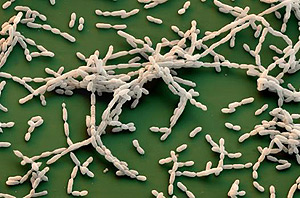BASF / PURAC
Negotiations to establish bio-based succinic acid joint venture / World-scale plant to start up by 2013 in Spain
Taking their R&D cooperation on bio-based succinic acid to the next level (see Plasteurope.com of 05.10.2009), BASF (Ludwigshafen / Germany; www.basf.com) and CSM (Diemen / The Netherlands; www.csm.nl) subsidiary Purac (Gorinchem / The Netherlands; www.purac.com) on 1 August announced that they had started talks to establish a joint venture to produce the bioplastic feedstock. The material has so far only been tested in-house by BASF and the two companies said they are now able to make larger volumes available to external customers.
 BASF and Purac's proprietary basfia succinicproducens microorganism is a natural producer of succinic acid (Photo: BASF) |
“We aim to be the first commercial producer in the market with a 25,000 t/y capacity fermentation production plant at the Purac site near Barcelona / Spain, with the intention to start up by 2013 at the latest,” said CSM chief executive Gerard Hoetmer, adding: “We are already planning a world-scale plant with a capacity of 50,000 t/y to account for the expected demand growth.” Leading drivers in the succinic acid market are bioplastics, chemical intermediates, solvents, polyurethanes and plasticisers. A report recently published by industry association European Bioplastics (Berlin / Germany; www.european-bioplastics.org) predicts that global bioplastics demand will double by 2015 – see Plasteurope.com of 26.05.2011.
Since first entering into a cooperation agreement in 2009, BASF and Purac have been working on a sustainable and efficient manufacturing process based on a proprietary microorganism known as basfia succiniciproducens. Said bacteria are a natural procuder of succinic acid and can process a range of C3, C5 and C6 renewable feedstocks, leaving a positive eco-footprint.
DSM (Sittard / The Netherlands; www.dsm.com) also recently touted plans to start producing succinic acid together with French starch and derivatives producer Roquette Frères (Lestrem; www.roquette.com) – see Plasteurope.com of 10.05.2011.
Since first entering into a cooperation agreement in 2009, BASF and Purac have been working on a sustainable and efficient manufacturing process based on a proprietary microorganism known as basfia succiniciproducens. Said bacteria are a natural procuder of succinic acid and can process a range of C3, C5 and C6 renewable feedstocks, leaving a positive eco-footprint.
DSM (Sittard / The Netherlands; www.dsm.com) also recently touted plans to start producing succinic acid together with French starch and derivatives producer Roquette Frères (Lestrem; www.roquette.com) – see Plasteurope.com of 10.05.2011.
03.08.2011 Plasteurope.com [219993-0]
Published on 03.08.2011

 German version of this article...
German version of this article...